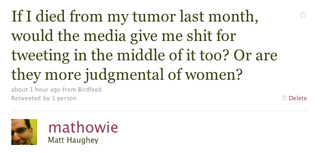In Defense of Twittering During Tragedy

Yesterday, I noticed blogs lighting up as they passed along the story of a mother supposedly twittering while her son drowned and the massive backlash that followed including instant accusations of parental neglect.
The story sounded too good to be true, the kind of stuff people write in their heads and hold in draft mode until the first opportunity presents itself to publish it, so I didn't read the specifics until this morning at ABC News. As an avid twitter user myself and someone used to sharing information about my life with friends online for 10+ years, I was astounded at the amount of negative attention the mother, Shellie Ross was (and still is) receiving from the story.
I'm someone in a similar position who posted to twitter (while in my hospital bed) just a few hours after my initial diagnosis of having a large brain tumor, and I have to say it was specifically so I could let my immediate friends and family that follow me on twitter know exactly what was going on as soon as possible. Posting to twitter meant I didn't have to do a dreaded phone call to dozens of people immediately after hearing my diagnosis, and for me it was both a time saving way to get the word out as well as the easiest way to communicate while I was exhausted and in and out of consciousness in the hospital.
The obvious sticking point in many stories about this drowning incident seems to be about new media and old. No one is surprised at frantic cell phone calls in a hospital waiting room, but apparently button mashing on a cellphone to alert friends via text to twitter is a surprise, simply because it is new.
What happened was a tragedy plain and simple. The family was doing things in the backyard, the pool gate didn't get closed, and an accident occurred. Some time after (reports vary but it looks like about half an hour after paramedics arrived) she updated her friends and family and asked them to pray for her son. This could have been on the trip to the hospital, as she was leaving home, or when she first arrived. Five hours later he was pronounced dead, and she updated her friends and family with the terrible news.
I myself posted to twitter five times from the hospital after my initial tweet, bringing people up to speed as I learned more. Half a day after I settled in at home I wrote a blog post further explaining it. I did this again to fill friends in and so I didn't have to relay the story 1,000 times later. I was commended a lot privately and publicly for being open and honest and sharing my story but to be frank I really don't know of any other way to be, this is just naturally the easiest way to communicate with friends and (some) family.
Since my parents weren't tuned into twitter, I did have to call them on that first day, and each day there after. In the end when I got home, I had to call about a dozen friends and family members that also aren't aware of my twitter account (or even what twitter is), and I have to say those were some of the most difficult calls to make, to drop bad news on happy friends and family. It was hours of work too, to explain and answer questions over the phone.
Twitter is a great tool for personal broadcast to a vast set of friends and family and it's quickly turning into a new default communication medium for the online world. It can certainly be distracting in the face of day-to-day cubicle work, but in this specific case it appears certainly to me that it had nothing to do with the death and was actually helpful at alerting friends to the accident and later informing them of the tragedy, and mirrors my own use of the service in a vaguely similar situation.
Subscribe to our newsletter.
Be the first to know - subscribe today





